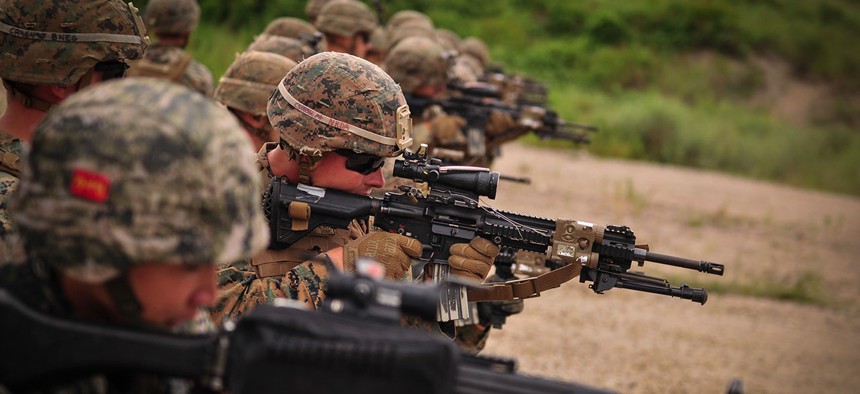
Koreans and Americans train at a firing range in Hawaii in 2017. Cpl. Aaron S. Patterson/U.S. Marine Corps
Curtailing Korean Exercises Comes at a Price, Says USMC Commandant
Gen. Neller says training on the Korean peninsula is an integral — if not quite irreplaceable — part of Marine readiness.
Gen. Robert Neller, the commandant of the Marine Corps, on Wednesday offered an apparent warning against further cuts to U.S. military exercises and training in South Korea. His careful defense of the importance of those exercises comes amid questions about what concessions President Trump may be willing to offer in his next round of talks with North Korea.
In June, Trump surprised Pentagon leaders and America’s South Korean allies by suspending some large-scale joint exercises. Emerging from a meeting with North Korean leader Kim Jong Un, the U.S. president described the exercises as “provocative” and “war games.”
But smaller-scale, more routine training exercises with South Korean troops continue. Neller argued that they are an integral part of maintaining Marine readiness, in part because the difficult terrain in South Korea makes it a “really good place to go train.”
“It’s hot in the summer, the hills are steep, it’s cold in the winter,” Neller told reporters at a Defense Writers Group breakfast. “If we lose the opportunity to go [train] places where the geography and the climate make it hard, you know, then where are we going to go? Where are we going to go?
“There’s other places to go and we can adjust,” Neller said. “But some places are better than others and Korea is, for battalion-, squadron-level stuff, blocking and tackling, it's just a really good place.”
The new head of U.S. Forces Korea, Army Gen. Robert Abrams, told lawmakers last month that cancelling the larger exercises had caused a “slight degradation” in readiness, but defended the decision as a reasonable diplomatic calculation and expressed confidence in U.S. Force Korea’s “mitigation plan” of “participation at a smaller level of staff exercises that would not be of the same scale, scope, and volume in the information domain.”
Neller on Wednesday offered a similar confidence in the Marine Corps’ ability to adjust if Trump decides to further curtail exercises.
"Obviously, if the president says, ‘Hey, we're not going to do these exercises,’ then we'll have to adjust,” Neller said. “We'll do whatever we have to do to support the policy direction of the government.”
Military leaders are currently planning next spring’s large-scale Key Resolve/Foal Eagle drills, but Abrams noted in late September that the decision to resume them rests with policy leaders. Trump, meantime, has publicly mused about removing U.S. troops entirely from the southern half of the peninsula.
The U.S. currently has around 28,500 troops in South Korea. Pyongyang has long called for their removal and criticized joint U.S.-South Korean exercises as provocative preparations for war.
Defense Secretary James Mattis has said that the U.S. has “no plans” to suspend any more exercises.
But until Trump emerged from his Singapore meeting with the North Korean dictator, there had been no plans to suspend Ulchi Freedom Guardian, which had been scheduled for this fall. Trump’s decision alarmed lawmakers and analysts, some of whom saw it as a dangerous concession to Kim without clear reciprocation. Large-scale military exercises like Ulchi Freedom Guardian, which last year ran 11 days and involved around 17,500 American forces and 50,000 South Korean troops, are a key part of maintaining military readiness and interoperability with allies.
“Right now, we have ability to go back and do small-unit things and we’ll continue to do that until we’re told otherwise,” Neller said.







